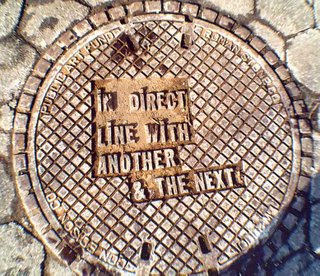
I have always been agitated by the rhetoric of bumper stickers. In fact, I have been mentally molested by the rhetoric of bumper stickers. I suppose it's because of my age (which is ancient). I was born in the early 1960's, and therefore I am part of the generation of the real Golden Age of television. (By the way, one should use an apostrophe when marking the plural of acronymns and dates. This is to prevent the /s/ being read as a part of the number or abbreviation. I am emphatic about this.) Oh, the "Golden Age of Television" was the era of Your Show of Shows and Ed Sullivan, according to the first historians of television, who became historians of television merely by writing a lot of wistful columns in Variety and other scholarly journals. Those were the years, they said, when television was its noblest. The real Golden Age of television was not noble at all. The content was not best, but it was more irrelevant than any later or earlier time, and therefore it was the Golden Age for television. It was when television was most efficient and powerful in delivering money to its investors, when three networks were at war for advertising dollars, when every American of sufficient means, and many of insufficient means, sat down every night and half of America every day to watch whatever was on. It was the age of advertising.
With the age of advertising came the slogan as cultural centerpiece, when a bastard witticism would be more powerful than any literary work or any artform else. The television shows generated catchphrases, but these hadn't the persistence and ineffability of "Aren't you glad you use Dial? Don't you wish everyone did?" or "It's the real thing." Don't get me wrong: advertising hasn't lost its power with the loss of television. It's gotten stronger, in fact. When a bent world can be persuaded to pay money to do the advertising for a shoe company and wear a slogan with no semantic value like "Just Do It," it's inarguable that advertising is the central load-bearing column of communication now. That's not the point. The point is that the bumpersticker is, to me, related to the Golden Age of Television and the nascent power of the advertising slogan as a community bond. The armchair sociology involved in that thought is something I'll return to another day, but today I want to focus on only one slogan.
(Everything I write seems so long. I'm sorry.)
Two years ago (my goodness, has it only been two years?), Wonkette had a lot of fun with a George Bush campaign "sloganator." It was designed for Bushers wanting to advertise and create a bandwagon without printing expenses or actually being met, known, or approved by the Republican Party. You'd go there, type in your slogan, like "Catfish Noodlers for Bush," and press a button to get a printer-friendly yard sign. Well, that was fun for some of the less dignified Kerry voters, too. They could go there, too, and put in their slogans, like "It Won't Get Any Better Bush/Cheney '04" or "Run for your Life! Bush/Cheney '04" or "War Crimes Docket: Bush/Cheney '04."
A friend of mine is married. Several married people are friends of mine, but this one was travelling behind a budget vehicle on the highway whose rear (the vehicle's) was covered with the fashionable vinyl siding of bumper stickers. They were for four or so bands that haven't been on the charts, a "Mean People Suck" sticker, and other evidence of mass-hipster humor, and his wife (the friend's) noted, "You know, he could have saved a lot of space with a single sticker that says, 'I'm in my mid-twenties.'" Great idea. If bumperstickers do anything (more deep questions like that on the day I talk about the ICTHUS sticker), they inform others of one's identity. They are the $1.00 identity politics solution. She was cutting to the heart of his discourse: he was advertising only his age, and not his taste, because everything else that his stickers said can be safely assumed by those who assume the mantle of dying adolescence.
That happened years ago. I'm talking about it today because a single grain of sand irritating me has produced its pearl (this blog post, I mean), and that grain of sand is "I X and I Vote." You know the form. Which ones have we seen?
- I Am Pro-Life and I Vote
- I Am Pro-Choice and I Vote
- I Own Guns and I Vote
- I Pay Taxes and I Vote
- I Farm and I Vote
- I Hunt and I Vote
- I Am a Mother and I Vote
- I Teach and I Vote
 You see, if you try to say, "I am pro-choice, and I vote," your audience is supposed to be some politician who is against choice, and he (or, in the case of Kathryn Harris in Freon County, Florida, she) is supposed to say, "Gosh, I'd better back off on my criminalizing legislation." First, of course, we ask ourselves about the efficacy of such a statement. Is Rick "Corpse Cuddler" Santorum (as the married friend calls him) going to be shocked into a new line of thought by such a slogan? This is even worse when the slogan isn't specifically related to a legislative issue, such as "I am pro-gun and I vote." After all, who is "anti-gun?" There are plenty of people who are anti-unlicensed guns, anti-huge guns, anti-automatic guns, anti-assault guns, anti-particle beam guns, and some anti-electron gun, but is anyone "anti-gun?" The news for "I am a farmer" or "I am a mother" is even worse. I'm told there are people against motherhood and hood mothers, but I haven't any proof of that. No, what these things say is far too general, and they can each be specified much more simply, like the hipster, above, as "I Am A Republican" or "I Am A Democrat," with "I care enough to register to vote some of the time" appended.
You see, if you try to say, "I am pro-choice, and I vote," your audience is supposed to be some politician who is against choice, and he (or, in the case of Kathryn Harris in Freon County, Florida, she) is supposed to say, "Gosh, I'd better back off on my criminalizing legislation." First, of course, we ask ourselves about the efficacy of such a statement. Is Rick "Corpse Cuddler" Santorum (as the married friend calls him) going to be shocked into a new line of thought by such a slogan? This is even worse when the slogan isn't specifically related to a legislative issue, such as "I am pro-gun and I vote." After all, who is "anti-gun?" There are plenty of people who are anti-unlicensed guns, anti-huge guns, anti-automatic guns, anti-assault guns, anti-particle beam guns, and some anti-electron gun, but is anyone "anti-gun?" The news for "I am a farmer" or "I am a mother" is even worse. I'm told there are people against motherhood and hood mothers, but I haven't any proof of that. No, what these things say is far too general, and they can each be specified much more simply, like the hipster, above, as "I Am A Republican" or "I Am A Democrat," with "I care enough to register to vote some of the time" appended.On the other hand, as a statement of personal identity, as a definition of how the self is not part of the others, these slogans are not terribly effective, either. After all, and make no mistake, these bumperstickers and t-shirt slogans are about who you are not, not who you are. They each have, implied within them, "Unlike the forces threatening my values, I plan to strike back at the ballot box." The real message of "I am an organic farmer and I vote" is "People are passing laws that threaten my livelihood, health, or happiness, and I will not support them." It's a laughable failure as a message. After all, it is the kind of oppositional identity bred of pure despair and frustration, and therefore it is an identification with a martyred loser or a beseiged minority. It admits, from the start, that the bearer feels all alone and wishes to put a thumb in the eye of the oppressor. Even when the position is actually the empowered and majority position, the slogan is defiance and rage born out of a sense that everything worthwhile is about to be destroyed.
Finally, as a statement of primary concerns, which would be what a real slogan of identity would be, it's a failure, too. Each variant on this slogan is attempting to say "I AM" a particular thing, with the promise that the reader can come up to the bearer and start a discussion or argument or fight. The problem is that very few people actually contain their identities in these issues. The issues are all high level complexes of propositions (sorry...I've been warned about that... they're all social tensions rather than individual ones), whereas identity is a psychological projection into the social sphere. In other words, although I may be passionate about getting us out of the current war and repairing our international standing, it really doesn't come up all that much in conversation. I rarely meet people who say, "You know, I hope we have more war, and screw the international community." Few people who know me would say, "Oh, he's a Democrat and he votes" in the first ten minutes of description. They'd probably comment on my conversational style, my body mass index, my vices, my alledged virtues, my purported learning, and my spastic manias, but they'd be a long time getting to my stance on the income tax.
So, I want to propose something, here. Everyone with such a sticker or slogan, go out and change it. Rip off the first part, at least. Replace it with the thing that really does identify you as a voter, as a person. Let's see some good ones. You know, the thing that your acquaintances (not your friends...if you have friends, you really should be talking to them instead of reading blogs) would say about you.
- I Am an Alien Abductee and I Vote
- I Am a Car Collector and I Vote
- I Am Depressed and I Vote
- I Hate the Neighbors and I Vote
- I Threaten People and I Vote
- I Think I'm Artistic and I Vote
- I Am Lonely and I Vote

2 comments:
I'm just glad SOMEONE links the "corpse cuddler" story.
Darn right. I also easter egged some of the links. If you have Firefox, you can see the address actually being linked to below "George Bush," for example, or, in the previous entry, "Weekly World News TV."
If you look for "Rick Santorum dead baby" on Google, the Post article is the #1 hit. That means a lot of pages are linking to it. That means that a lot of people can't get over how ghoulish it is.
Post a Comment